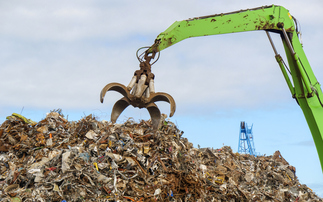From surprisingly popular waste reforms to damaging popular renewables technologies, yesterday was another confusing day in the UK's green policy landscape
Say what you like about this government (and you really should, after all it is not every day that a sitting government earmarks billions of pounds that could be spent on tackling fuel poverty or food poverty or homelessness or providing the UK with 21st century infrastructure and instead uses it to prepare for a full scale, troops-on-standby, civil emergency of its own making), they don't do things the easy way.
The undercard for yesterday's latest round of auto-satirical Brexit news should have been the unveiling of the government's long-awaited and genuinely popular Waste and Resources Strategy. Here was government doing what it is supposed to do: identifying a problem, listening to experts and competing interests, laying the political groundwork, then coming forward with credible proposals.
It wasn't perfect - nothing is - but Michael Gove's new strategy had plenty to recommend it. There were measures that will prove popular with the public, such as deposit return schemes and food waste bins; a move to tackle the market failure that results in resource inefficiency by pushing more of the cost of waste management onto the packaging producers who cause the waste in the first place; a recognition that approaches to recycling need streamlining and standardising; and a wide range of targeted policies that should help boost recycling rates and encourage circular economy models.
Consequently, the response from businesses and campaigners alike was almost universally positive. "Substantial credit is due," said the Industry Council for Packaging and the Environment. "We welcome a strategic approach," said the British Retail Consortium. "A much needed framework to reboot recycling," said CIWM. "The government appears to be getting serious about tackling England's vast mountains of waste," said Friends of the Earth. When you are getting reviews like that from the industries that are now facing higher costs and considerable disruption as a result of the reforms, as well as the campaign groups whose job it is to be professionally unsatisfied, then you must have done something right.
Inevitably, there are still plenty of reasons to fear the new strategy could end up flattering to deceive. The waste and recycling sector is staring down the barrel of considerable 'no deal' Brexit disruption. There are legitimate questions about the cost implications of new packaging charges for retailers and manufacturers and how they could end up being passed onto consumers. Similarly, it remains to be seen if local authorities, enforcement agencies, and waste management firms will be provided with the necessary financial and political backing to turn these bold reforms into a reality. As such, concerns remain that the most progressive parts of the strategy could be watered down at consultation or diluted by under-funding as the policies are deployed.
Moreover, a cynic would note that so much of this strategy is a pretty damning indictment of the eight years of Conservative-led government that preceded it - a period during which recycling rates in England have largely flat-lined, even while they have continued to make impressive progress in Wales. The 2011 Waste Strategy was an instantly derided dumping ground of warm words and negligible policy. The industry warned it would fail to move recycling rates one iota and, lo and behold, it did not. For years after, Ministers would look at the problem, and then do nothing.
It took Michael Gove to seize the opportunity presented by the combination of the 'Blue Planet effect' and China's decision to ban waste imports, listen to what the industry and the public were saying they wanted to see, and engineer a genuinely ambitious new strategy. Whatever you think of the Environment Secretary's Brexit-related contortions, his tenure at Defra has been a daily rebuke to the cack-handed indifference of too many of his predecessors. It is also proof that departments can, on occasion, prepare for Brexit and make meaningful policy progress on the domestic front.
It should have been a good day for the UK's green economy, defined by encouraging evidence that the government, on the back of unveiling plans for the world's first 'net zero' industrial hub and celebrating the latest record-breaking statistics from the offshore wind industry, is serious when it says it wants to deliver a green, circular, and decarbonised post-Brexit economy.
And then came news the self-same government really was going to axe incentives for new solar installations in a way that means they will have to export power to the grid for free. Yes, you did read that right. Install solar panels from next April and any of the clean power you generate that you can't use on site will flow into the grid for gratis.
"Not right or fair," declared Labour. "Perverse," complained Greenpeace. "Damaging market confidence," warned the solar industry. It is hard to disagree.
The decision is the latest twist in the saga of the Feed-in Tariff, a scheme so serially mismanaged it was basically a Brexit metaphor even before we knew what Brexit was. As in all the previous fumbled reforms to the scheme there is a rationale for what the government is trying to achieve. Solar costs have plummeted meaning there is arguably no longer a need for a subsidy scheme that is ultimately paid for through a levy on all our energy bills. Having a fixed export tariff rate for power provided to the grid does run counter to the government's vision of competitive and flexible energy markets. There is also value in incentivising households and businesses to use as much power as possible onsite by installing storage systems.
And yet, the industry is completely justified in its anger this evening. The vast majority of respondents to the government's consultation highlighted the problems associated with forcing people to give away power for free, both on grounds of basic fairness and the way in which it undermines the transition towards truly smart grid systems where distributed solar and storage systems can provide power back to the grid at peak times. Solar costs have plummeted and the government could have provided a smooth glide path to removing subsidies altogether in a way that allowed for sustained growth. The industry has repeatedly put forward credible and genuinely low cost policy tweaks that would make a big difference to stalled deployment rates and the UK's decarbonisation efforts. Instead Ministers look to have fueled yet another boom and bust cycle (albeit it'll likely be a pretty small boom), and further undermined efforts to ensure distributed clean energy technologies live up to their huge potential.
Worse still, Energy and Clean Growth Minister Claire Perry had hinted pretty strongly that she was not happy with a scenario that would force people to hand over for free. And yet weeks later that is precisely what has been signed off on.
A spokesman this morning indicated that the government was aware there was an issue here, declaring that "we will consult shortly on a future framework for small-scale renewable energy generation". But why shortly? Why not before killing the current framework?
This transition could have been managed in a way that still ended subsidies, provided a new framework that allows people to sell their solar power at a fair price, and encouraged continued investment in emerging storage and smart grid technologies. Instead businesses that invested in supporting the UK's low carbon transition, just as Ministers said they wanted to see, are now left facing yet more policy uncertainty due to what looks like a pretty basic failure to properly consider what will happen when the current policy framework comes to a close. I did say it was basically a working Brexit metaphor.
The net result is yet another day in the UK's continuously disorientating low carbon journey. We've already had net zero industrial hubs sitting alongside aviation expansion plans in the past week, not to mention fracking earthquakes and nuclear set-backs in parallel with record offshore wind installations. And now a government capable of securing positive headlines over waste policy of all things has seemingly taken the most popular form of renewable energy, torched its policy framework, acknowledged a new policy framework is needed, and then told businesses and investors 'we'll get to it eventually, perhaps before your customers have to give their power away, perhaps after'. They really don't do things the easy way, do they?
This post first appeared as part of the BusinessGreen Overnight Briefing









